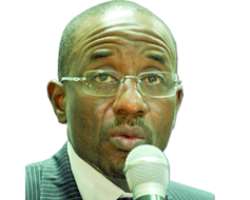REPS BACK SANUSI OVER ISLAMIC BANKING

Sanusi
The two controversial policies conceived by the Central Bank of Nigeria (CBN) received support of the House of Representatives after about an hour lecture by the CBN Governor, Sanusi Lamido Sanusi yesterday.
Sanusi took the House through the gamut of the policy limiting cash withdrawal to N150, 000 and the introduction of Islamic banking, one of the non-interest financial system and received a thunderous applause at the end of the lecture.
Deputy Speaker, Emeka Ihedioha, who presided over the plenary, declined to entertain questions, which led to a walk out by aggrieved members who felt that there was a need to ask Sanusi questions.
Bimbo Daramola (ACN) Ekiti State and Bitrus Kaze (PDP) Plateau State led the protest against the ruling of the deputy speaker.
Defending the new policy that would limit cash withdrawal to N150, 000 without paying charges, Sanusi said it would help to raise money to offset the cost of cash management in the banking industry, which was expected to reach N192 billion by the end of 2012 fiscal year.
Exuding confidence, the CBN governor told the House that it was a misinformation that there was limit to cash transaction. What the policy tends to achieve, he said, was to ensure that high volume cash users should bear the service cost.
'The industrial proposal is not to place limit on cash transactions, but that the 10 per cent for customers that make high volume cash transactions will bear the associated cost and eliminate the subsidy by the mass public of banking customers.'
The policy, according to the CBN governor, would have a direct impact on banking industry efficiency and cost structure, such as reducing the cost of cash to the financial system through significant savings that would be passed on to customers in form of reduced cost of banking services and lower lending rates to borrowers.
Sanusi said implementation of the scheme had been phased, and that it would start with Lagos State by next January.
Before June 2012, Sanusi said over 100, 000 Point of Sales (POS) would have been rolled out, while stating that CBN had reached agreement with telecommunication networks to provide dedicated channels for transaction of data.
He explained that 16 mobile payment service providers had been issued and approved in principle to commence service in the next three months.
The objective of the policy on cash withdrawal, he added was different from the Money Laundering Act 2004, which limited a threshold of cash payment outside the financial institution to N500, 000 for individuals and N2, 000, 000 for corporate body.
The policy, he also noted, would discourage the importation of dollar into the country, even as he regretted the culture of demanding for payment in dollars by proprietors of private schools and some landlords for payment of rent.
'We are starting the pilot scheme in Lagos and I can tell the House that CBN is enjoying the cooperation of Governor Fashola. If you go to Lagos next January, you will see the difference in banking.'
On the controversial Islamic banking, Sanusi said it was a product introduced over 35 years ago, with over 75 countries embracing it and spread over 435 institutions in USA, UK, Luxembourg, Malaysia, Singapore South Africa, Uganda, Senegal, Gambia, among other countries.
As a sign of its acceptability, he further said DOW Jones, NASADQ, FSTE and Hang Seng had Islamic financial indices in their daily transactions.
Tracing the history of Islamic banking in the country, Sanusi said the process of approving the license dated back to 1991 when the Banks, Insurance and other Financial Institutions Act was amended.
Reading from some internal memo of the CBN, he said the first application to open an Islamic bank was received between 1991 and 1993 from Alquida and Albarka banks, while an approval to open an interest free bank window was given to Habib Bank in 2004.
The approval to open Islamic banking window was given by his predecessor, Prof. Charles Soludo on October 28, 2008 to Intercontinental Bank, UBA, Standard Chatered and Habib Bank.
Sanusi said the approval was given six months before he assumed duty as CBN governor, adding that the majority of directors of the CBN who participated in the process leading to the issuance of the license for the Islamic banking belonged to Christian faith.
According to him, the CBN Financial System Stability Committee had Prof. Soludo as chairman, the Deputy Governor, Tunde Lemo, a Christian and a pastor, while Dr. Kingsley Moghalu, another Christian was later brought from Geneva to work with the CBN.
Sanusi said they were joined by Christian Chukwu to midwife Islamic banking, noting that Anambra State had applied for loan from the bank.
He also announced to the House that he had received an application from an Igbo landlord to rent his house for a branch of Islamic bank.
The CBN governor also told the House that an Igbo man held the second largest share in the Jahis Islamic Bank of Malaysia, adding that NDIC had issued insurance license and guidelines to African Alliance and Cornerstone to practice Islamic insurance.
Members, who protested against the ruling of the deputy speaker, argued that they have questions to ask the CBN governor over the two policies.
Uche Ekwunife said the CBN needs more explanations to make on how the policy limiting withdrawal will affect the people in the rural areas where banks have no branches.
